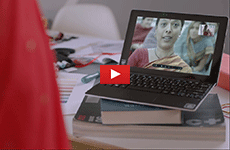

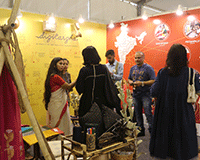
"The warp and weft come together to weave more than just fabrics; On a loom in a weaver's home, Dreams are woven from threads of hope. The constant rattle of the shafts serve as the theme music; The weaver becomes the Maestro and the work, their legacy.”
DigiKargha, a social entrepreneurship and handloom empowerment initiative of Digital Empowerment Foundation (DEF), spearheaded this legacy through an exclusive showcase, of eight handloom clusters where its present, at the Lakmé Fashion Week in Mumbai last month.
New Year 2018 started off on a great note for us with DEF getting an invitation to participate in one of the biggest fashion events of the country, the Lakme Fashion Week (LFW). The core vision and mission of LFW lies in redefining the future of fashion and integrating India into the global fashion world. But it’s more than just a fashion event. Lately ‘sustainability’ has become the buzzword in Indian fashion and no doubt was also the major talking at LFW. Echoing the need of the hour to highlight responsible fashion, the second day of LFW was celebrated as Sustainable Fashion Day, dedicated entirely to the cause of conscious and ethical practices in the industry as a whole.
On the same day, ‘Action Northeast’, was launched, an initiative in collaboration with the United Nations India that aims to boost sustainable fashion economy of the Northeast India region. The event saw some noted guest speakers, including DEF Founder-Director Osama Manzar, and featured six designers from the area, who have been doing their bit in drawing on the untapped potential of rich traditional textiles in the area by working closely with various artisan communities. Read More


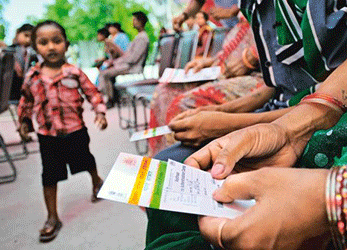


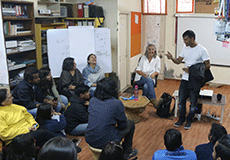
On February 9, 2018, DEF hosted its fourth DEFdialogue with Ulrike Reinhard. Ulrike Reinhard is a German publisher, author and futurist. She is best known for her skatepark in Janwaar Castle in rural Madhya Pradesh. Ulrike has travelled to more than 100 countries where she has spoken to Nobel Laureates, nominees for the Nobel Peace Prize, high ranking politicians, internationally acknowledged visionary thinkers, successful entrepreneurs, outstanding critics, activists and down-to-earth field practitioners. Ulrike started work at Janwaar Castle in 2014 with a social experiment – a skatepark in a rural village in the heart of India. Read More

United Nations recognises February 13 as World Radio Day. To mark this occasion in India, the International Association of Women in Radio and Television (IAWRT) and UNICEF India hosted the first Radio Festival in New Delhi on February 15 at UNESCO House. DEF participated in the festival with an audio-based installation that narrated stories from the ground in the voices of our beneficiaries, simply by scanning QR codes from your phone camera. You can listen to a collection of voices from the ground of people whose lives have been impacted through access to digital tools and ICT here.

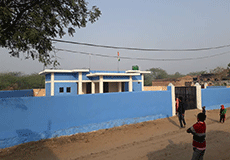
This month, DEF and Nokia are happy to initiate their Smart Village rural entrepreneurship-based project based on a hub-and-spoke model in Nuh (Haryana) and Asoor (Tamil Nadu). It is a model concept that has been conceptualised in a manner that challenges and redefines the existing idea of smart villages, which is based more on the availability of digital infrastructure but not as much on the integration of the infrastructure into the daily lives. We believe that the mere availability of digital tools and Internet connectivity alone does not make a village smart. Read More
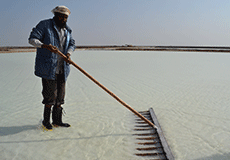
DEF team member Ravi Guria recently visited the Little Rann of Kutch in Gujarat where DEF runs project Zero Connect. He recalls his visit here. One has seen spellbinding visuals of the Little Rann of Kutch in the magazines and the Internet, but nothing prepares you for the experience, than actually being there. I arrived in Ahmedabad, and set off for Patdi, which is around 120 km from Ahmedabad. Patdi is a dusty small town on the edge of the Little Rann of Kutch. Kutch is massive region extending all the way to the Pakistan border. It is divided into two parts, the Little Rann of Kutch and the Greater Rann of Kutch. Read More
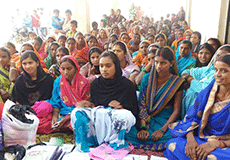
Community Information Resource Centre (CIRC) Manjladih in Giridhi district of Jharkhand organised a meeting with over a hundred self-help group members to highlight the importance of digitalisation of accounts and other necessary documentation. In Jharkhand, meanwhile, community mobilisation is underway in schools to encourage students and teachers in public and private primary schools to enroll for digital literacy. DEF offers community members in the region basic IT skills for first-time computer and Internet users. Committed to the vision of DEF, the local team has been enthusiastic about training more and more individuals.

In collaboration with CRY and Mahila Jan Adhikar Samiti (MJAS), DEF has opened another CIRC in Rajasthan to provide digital literacy, information services and citizen services, with children as its key target group but not limited to it. For this purpose, a two-day workshop was organised in Ajmer to train six MJAS staffers to become CIRC entrepreneurs who were capacitated to manage operations, deal with data, carry out community mobilisation, use innovative ways to train children in digital literacy, and provide a range of information and digital services in the communities they serve.

CIRC Nichlagarh, along with local partner Doosra Dashak, organised a one-day cricket competition with the youth enrolled at the centre for digital literacy. This also encouraged the community to clear up a field to prepare it for a pitch for a match between the students of Nichlagarh village and the students of Redwakala village. The match was won by the latter team, which received a trophy and a token cash prize. The centre frequently organises such activities that encourage community efforts and community ownership. CIRC Nichlagarh has so far trained more than 600 boys and girls in digital literacy within a radius of 15-20 km.

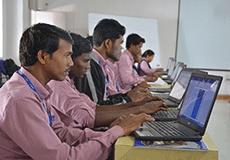
DEF has entered into a new partnership with the Bharat Rural Livelihood Foundation BRLF) to make 28 tribal students, from various parts of the country, digitally literate to use Microsoft Suite and smartphones; and digitally enable them to create digital content to effectively use various social media platforms, including WhatsApp and YouTube. A recently concluded four-day training helped the students achieve functional digital literacy to enable them to incorporate digital tools into their daily lives. Some students showed extra interest and even went on to learn to operate mobile apps like Filmorago and Picsart for video and photo editing, respectively.
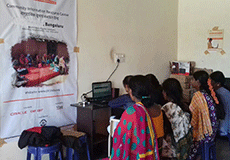
CIRC Bengaluru has been continuously striving to train first-time women learners of digital tools, living in urban slums on the outskirts of the city in Karnataka, with much passion and enthusiasm. Supported by Oracle and Charities Aid Foundation, the centre run by DEF engages women in various activities that not just builds their digital capacities but also inculcates leadership skills among them and infuses a sense of confidence among homemakers. So far, the centre has reached out to more than 250 women and children, enabling them to use the computer and basic Internet applications with ease.

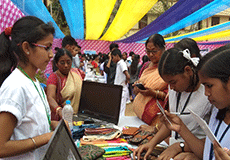
DEF’s ongoing efforts in the handloom cluster of Barpali under project DigiKala, an initiative supported by Microsoft, were recently recognised by the Veer Surendra Sai University of Technology in Burla, Odisha. The institute invited the project to display its exquisite ikat handloom products at the Makers Fest on February 10-11, 2018. Makers Fest is an amalgamation of festivals celebrating innovations, innovators and artisans. It is the Indian continuation of Maker Faire hosted across America, Europe, Africa and Japan, among others. Creators, artists and hobbyist are invited to present their contemporary ideas using the vast ocean of art, science and technology.
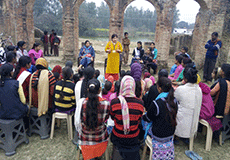
A team from the ICICI Academy for Skills visited our Baank-e-Loom centre in Uttar Pradesh last month to interact with girls in Saidanpur and nearby villages. Shilpee Adhikari from the ICICI Foundation shared details about the bank’s non-profit job-oriented three-month training programme, which will be held in Lucknow, for girls between the age group of 18 to 30. An aluma of the training, Parul Saxena, too, visited the centre to share her experiences. Meanwhile, Team Baank-e-Loom visited Bhaisuria, Maulabaad, Kashipurwa and Turkani villages to mobilise communities about various social welfare scehems that are available for them. Read More
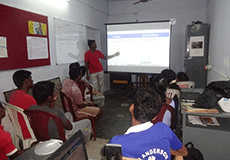
As part of the ongoing training programmes being carried out for weavers in Tamil Nadu, the KanchiLoom project, an initiative of DEF and Nokia, hosted a social media training for youth from weaver families in February 2018. Youth trainee were divided into three groups of 20 each, and given hands-on training in using various social media tools for awareness, marketing and sales. The workshop was also attended by representatives of the Kancheepuram Kamatchiamman Silk Society who focused on the importance of outreach to compete with the low-cost powerloom market, which is a challenge to the handloom industry.
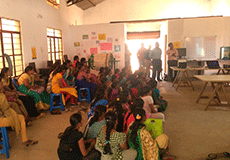
The handloom and textile department of Karnataka, headed by its director, Mr. Syed, visited project Kaulava regional office in Kollegal last month to understand the efforts that are being made by DEF in collaboration with Microsoft in the cluster. On this occasion, an interactive session was organised in Kollegal, where as many as 60 weavers gathered as part of an exchange programme between the visiting weavers and the native weavers who discussed the challenges of the sector and brainstormed on the way forward. The session also encouraged youth from non-weaving households to utilise their skills for the economic benefits of the cluster.
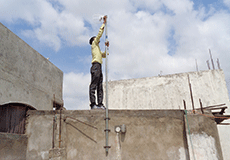
In an effort to make the Internet more accessible to weavers in Musiri, Tamil Nadu, and enable them to access the opportunities the Internet offiers, 100 wireless Internet nodes will be set up in the town by the end of March. These nodes are being established at public places such as hospitals, schools, cooperative societies and even at DEF’s regional weavers’ centre. Team Musiri is also training youth from weaver families to leverage the power of social media to reach out to a global audience to market their cluster as a brand. Project Musiri is an initiative of DEF and Mphasis to digitally empower weavers in the region.

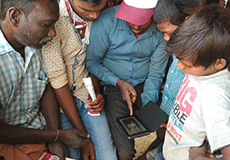
DigiSupport, a project initiated by DEF with support from Axis Bank to empower financially excluded communities to digitally access and consume financial services through digital interventions, has successfully reached out to more than 1,116 rural beneficiaries in 10 villages. An army of DigiPreraks or rural entrepreneurs have been diligently mobilising the communities they serve to provide create awareness about digital financial services and literacy through door-to-door campaigns, video screenings, focused-group discussions, street plays and training sessions. In the next leg of the project, 40 more villages will be covered.

Dharmendra Singh Rajput, a small farmer in Balakheda village of Guna in Madhya Pradesh, was struggling to grow vegetables due to unavailability of water and irrigation facilities. Sometime ago, CIRC Madhusudhangarh informed him about drip irrigation and registered him under various schemes he was eligible for under the horticulture departments. Today, Dharmendra has bought the drip irrigation system at a subsidy of 50 per cent and is able to grow crops successfully in the summer. Dharmendra is not alone, CIRC Madhusudhangarh has been working with hundreds of farmers in the reaching to improve their livelihood.
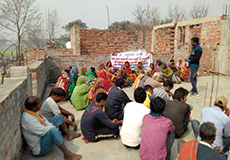
Aligned with DEF’s agenda to empower the common citizen with information services and access to schemes and entitlements, Soochna Seva team in West Champaran, Bihar, has established a Grievance Redressal Citizens’ Committee to monitor, guide and carry forward the tasks of the team in a more concentrated manner. For this purpose, six members have been made responsible to ensure collective actions, especially in Balthar panchayat of Sikta block. Since December, this team has met more than 70 members from relevant stakeholder groups and held a grievance camp to register complaints and facilitate actions on the same.

On February 24, 2018, DEF in partnership with Qualcomm launched the second phase of the SoochnaPreneur project in Alwar (Rajasthan), this time with a women-only team of 100 information agents. This phase of the project is also supported by Ibtada, an organisation that has been working towards women empowerment for the last 20 years in Alwar. Several women selected for the initiative are leaders of self-help groups nurtured by Ibtada. Women SoochnaPreneurs were formally introduced to the project on the occasion of the launch in the presence of Ramgarh BDO Pradeep and Ibtada Executive Director Rajesh Singhi. Read More


Last month, the Research and Advocacy team of DEF released a research paper titled Kept in the Dark: The Social and Psychological Impacts of Network Shutdowns in India. it takes an in-depth look at how network shutdowns affect communities and threaten political stability. As the Internet becomes more pervasive to daily life, blocking access to the same disrupts residents’ ability to access information, education, financial and emergency services, employment opportunities and social activities, thus affecting the psychological health of residents. The research team will be another similar study in Darjeeling soon.


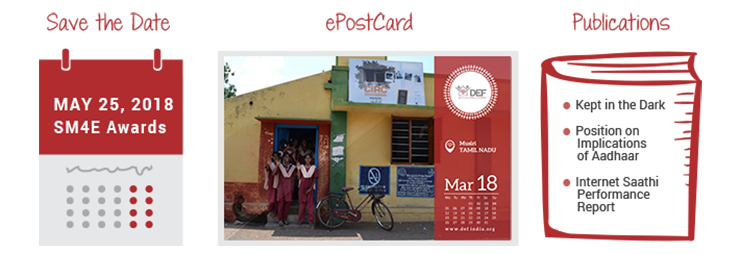


Internet Society Nepal

At a time when the #MeToo movement has drawn global attention to sexual harassment at the work place, gender-power relations and hostile sexism endured by women, the pernicious issue of online sexual harassment of women and girls has not gained any traction in the public consciousnesses and continues to be missing from the larger narrative on violence against women. An online anti-harassment campaign is now trying to bring public attention to the growing incidence of cyber violence and sexual abuse faced by women in India. Read More
House No. 44, 3rd Floor, Kalu Sarai, New Delhi | def@defindia.net | www.defindia.org | +91-11-26532786



